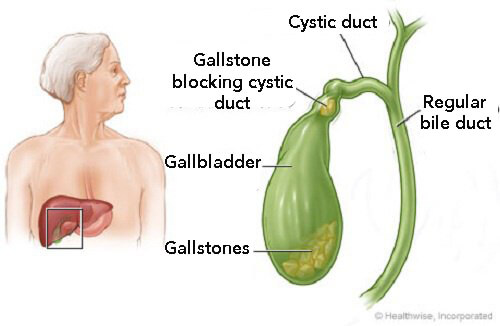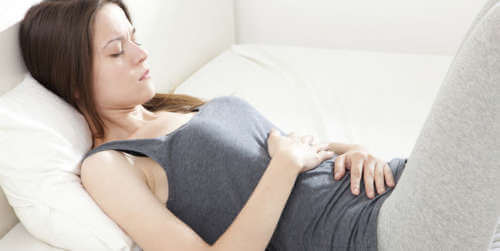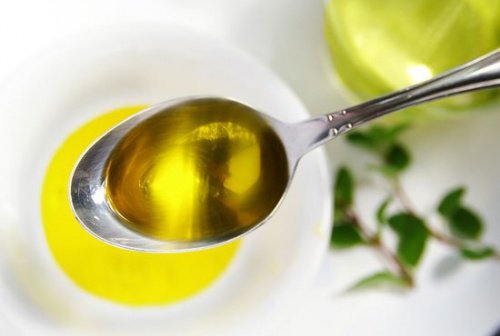How to Know If I Have Gallstones


Written and verified by psychologist Valeria Sabater
Gallstones sometimes occur without any evident symptoms. We just keep on with our regular life without knowing that anything is wrong. Poor nutrition can be the cause of this condition, so let’s learn how to recognize this problem and avoid it ahead of time.
Symptoms of gallstones

Have you ever asked yourself what gallstones are? They are hard, little crystals that block your gallbladder from carrying out its most basic functions. They appear in your body because of changes in bile, infections, small problems in the gallbladder’s capacity to drain, or due to high cholesterol or poor eating habits.
Many people, in the end, have to have surgery in order to remove these stones. Since this problem is quite common, we should try to prevent it, if possible. That’s why we’re going to show you a few of the main symptoms of gallstones.
However, we should clarify that doctors say that about 40% of cases occur with absolutely no symptoms. But in case you fall into the other 60%, let’s take a look at those symptoms.
1. Type of pain
The pain appears suddenly and lasts for just a few seconds. It is located in the upper right part of the abdomen or between the shoulder blades. These are the first symptoms and signs that the stone is moving around and starting to block your cystic ducts or bile ducts.
2. Bloated stomach
Don’t worry. Obviously, it’s quite common for stomachs to bloat without having anything to do with gallbladder stones. However, if you do suffer from bloating, think about the following questions: Do you experience bloating every day? Is it almost always right after you eat? The best thing you can do is keep track of your symptoms.
If you are constantly bloated and also experience some of the other symptoms explained in this article, then you should consider the possibility of gallbladder stones.
We also recommend:
3. Digestion problems
When someone is suffering from gallbladder stones, they tend to have small or even noticeable digestion problems. Issues such as indigestion, gases, burping, inflamed intestines, abdominal cramping, feeling sick after eating.
They can also experience a low tolerance for fatty foots. They fill you up and upset your stomach… that is very characteristic of gallbladder stones.
4.Physical symptoms
These symptoms do not occur in all patients, but if they do, you should pay attention: your skin may become slightly yellow due to the bile, and you may also see the white part of your eyes start to turn a bit yellow.
5. Changes in feces and urine
You should keep in mind that the gallbladder is responsible for producing bile, processing fats and aiding in digestion. If you have a problem in your gallbladder, like stones blocking up your gallbladder, this will affect your entire digestive and excretory system.
In terms of feces, it is quite common for people who suffer from this condition to note whiter, more gelatinous feces. Your urine, on the other hand, may appear darker than normal. You should try to keep all of these factors in mind.
Also read:
Tips to protect your gallbladder

If you already have gallbladder stones, suddenly adopting a healthy diet is not going to get rid of them. You should always allow your doctor to decide whether or not you need surgery to remove these stones.
However, if you’re not suffering from any symptoms yet, you should try to prevent this condition from affecting you by following these tips.
- Before going to bed and right when you wake up in the morning, take one tablespoons of olive oil and three drops of lemon juice. This remedy is great for protecting and purifying your gallbladder.
- Natural beet and apple juice. This super healthy juice is great for drinking at dinner time. You should use a green apple and a medium-sized beet, cut them into pieces and blend them together with a cup of water. Drink this three times per week and it will surely be of help to you and your gallbladder.
- Brewer’s yeast: you can include this substance in your smoothies or juices. It has great benefits because it is a good source of inositol, which is perfect for protecting your gallbladder and liver.
If you do start to experience symptoms, remember that you should go see your doctor. They will be able to do a few tests and determine whether or not you are suffer from gallbladder stones.
All cited sources were thoroughly reviewed by our team to ensure their quality, reliability, currency, and validity. The bibliography of this article was considered reliable and of academic or scientific accuracy.
- Biblioteca Nacional de Medicina de los Estados Unidos. Cálculos Biliares. https://medlineplus.gov/spanish/gallstones.html
- Biblioteca Nacional de Medicina de los Estados Unidos. Cálculos Biliares. https://medlineplus.gov/spanish/ency/article/000273.htm
- American College of Gastroenterology. TRASTORNOS DEL TRACTO BILIAR, TRASTORNOS DE LA VESÍCULA BILIAR Y PANCREATITIS POR CÁLCULOS BILIARES. https://gi.org/patients/recursos-en-espanol/trastornos-del-tracto-biliar-trastornos-de-la-vesicula-biliar-y-pancreatitis-por-calculos-biliares/
- National Institutes of Health. (2015). ¿Irritado por la vesícula biliar? https://salud.nih.gov/articulo/irritado-por-la-vesicula-biliar/
- BMJ. 2007 Aug 11; 335(7614): 295–299. Clinical Review: Gallstones. doi: 10.1136/bmj.39267.452257.AD
- Altern Med Rev. 2009 Sep;14(3):258-67. Nutritional approaches to prevention and treatment of gallstones. https://www.ncbi.nlm.nih.gov/pubmed/19803550
- WebMD. Understanding Gallstones — Prevention. https://www.webmd.com/digestive-disorders/understanding-gallstones-prevention
- Korean J Fam Med. 2016 Jul; 37(4): 205–213. Published online 2016 Jul 21. Preventing a Mass Disease: The Case of Gallstones Disease: Role and Competence for Family Physicians. doi: 10.4082/kjfm.2016.37.4.205
This text is provided for informational purposes only and does not replace consultation with a professional. If in doubt, consult your specialist.








